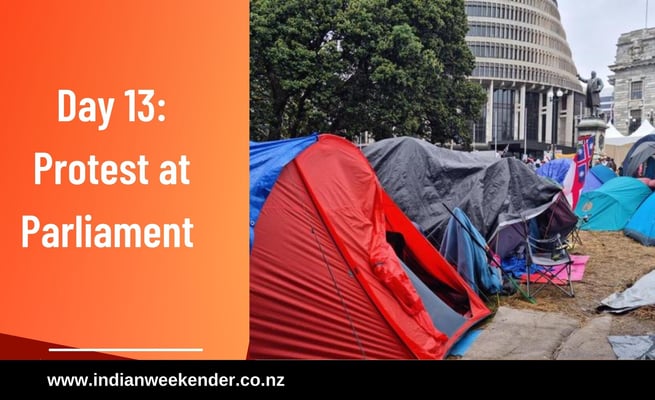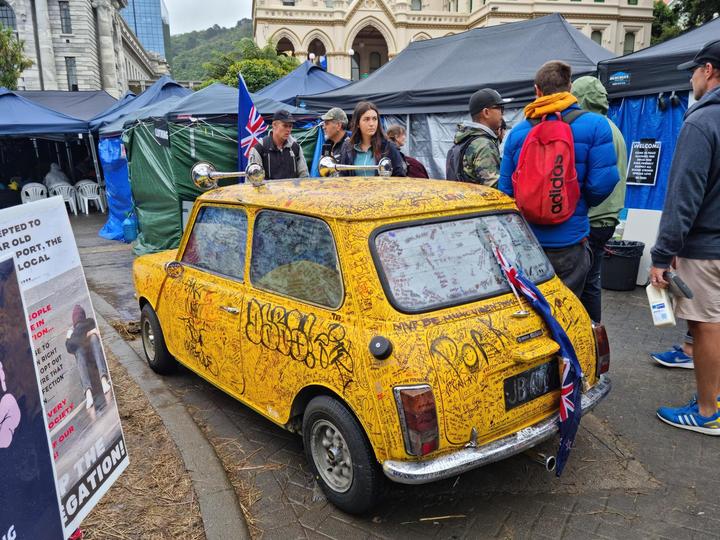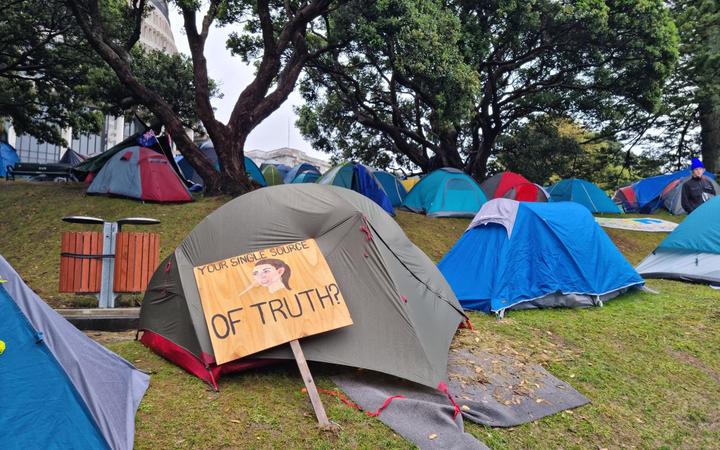Protest remains entrenched on day 13 despite heavy rain

Heavy rain in Wellington overnight has done little to deter the protesters occupying Parliament's lawn and surrounding areas.
The demonstration is now on its 13th day - and the camp is firmly entrenched.
Protesters - many wearing jackets or ponchos - have been queuing by a food stall this morning for breakfast and coffee.
The ground is sodden, but mats and hay have been spread around to prevent too much muddiness.
Police Commissioner Andrew Coster told TVNZ's Q&A on Sunday the protest "shouldn't have got to this" and he had "no idea" how it would end.
He said the protest was "unlawful and unreasonable", but the level of confrontation which would have been required to shut it down would not have been acceptable to New Zealanders.
"This is a really unpleasant, difficult situation, and I'm concerned people are being affected in this way."
Coster reiterated the police would continue talks with the protest organisers to try de-escalate the situation.
"The tactics have to be appropriate for all involved," Coster said. "I think there is a good opportunity to de-escalate."
Police estimate 800 vehicles remain illegally parked in and around Parliament.
The registration details of vehicles are being taken by officers with a view to enforcement action later.
Police said they had expected the number of protesters to grow over the weekend and were determined to encourage the arrivals to use proper parking spaces and not block more roads.

A graffiti covered car parked at the protest camp at Parliament. Photo: Craig McCulloch
The protest which began on 8 February, yesterday drew a crowd of more than 1000 people.
Two cars parked illegally on Thorndon Quay were towed yesterday, while 15 others were moved voluntarily by protesters after officers spoke to them.
The 450 parking spaces at Sky Stadium made available to the crowd are now full.
In a statement issued yesterday, police said they continued to have a large presence in the central city, including a team ready to respond to incidents outside the Parliamentary precinct.
"We continue to maintain a highly visible, reassurance presence on site, and staff are engaging with the public and protestors to provide advice and, where necessary, take enforcement action," the statement said.
The statement said police also had a presence at smaller protests in Christchurch and Picton on Saturday.
Mallard asks officials to look into fencing Parliament.
Parliament Speaker Trevor Mallard has asked officials to look into the cost and practicality of fencing the complex to prevent a repeat of the occupation.
Mallard said he asked Parliamentary Service to begin the work on Tuesday - but expected it would take months for a plan to be drawn up.
If approved, Cabinet would then have to sign off on the funding.
The grounds are currently surrounded by low walls that allow free access to pedestrians.
Protesters remove shower at war memorial
Anti-mandate protestors have removed a suspected makeshift toilet or shower next to the Wellington Cenotaph.
The veterans charity group, No Duff, criticised protestors after photos emerged of the structure and graffiti, chalk and placards littering the war memorial.
Co-chair Lars Millar said it was shocking to see the sacred site had been defaced.
Millar said while the mess has now been cleaned up, the group was concerned that the cenotaph could be defaced again as more protesters arrive.

A sign leans against a tent at the protest camp at Parliament. Photo: Craig McCulloch
Disruption continues
Wellington schools located near the protest at Parliament will keep using security guards to escort children to and from their grounds.
St Mary's College and Sacred Heart Cathedral School are in Guildford Terrace, off Hill St, which runs along the northern side of Parliament Buildings.
St Mary's principal Andrew Murray said the Ministry of Education had helped provide guards as the disruption continues.
"It's just being proactive, making sure the girls are feeling safe," he said.
"And the feedback from my community has been overwhelming support in terms of the way we're looking after students in that particular space."
Three guards are stationed at the school in the morning, and one walks with students to and from the railway station.
Murray said staff were also strategically placed between the schools and the station.
Heavy rain in Wellington overnight has done little to deter the protesters occupying Parliament's lawn and surrounding areas.
The demonstration is now on its 13th day - and the camp is firmly entrenched.
Protesters - many wearing jackets or ponchos - have been queuing by a food stall this morning...
Heavy rain in Wellington overnight has done little to deter the protesters occupying Parliament's lawn and surrounding areas.
The demonstration is now on its 13th day - and the camp is firmly entrenched.
Protesters - many wearing jackets or ponchos - have been queuing by a food stall this morning for breakfast and coffee.
The ground is sodden, but mats and hay have been spread around to prevent too much muddiness.
Police Commissioner Andrew Coster told TVNZ's Q&A on Sunday the protest "shouldn't have got to this" and he had "no idea" how it would end.
He said the protest was "unlawful and unreasonable", but the level of confrontation which would have been required to shut it down would not have been acceptable to New Zealanders.
"This is a really unpleasant, difficult situation, and I'm concerned people are being affected in this way."
Coster reiterated the police would continue talks with the protest organisers to try de-escalate the situation.
"The tactics have to be appropriate for all involved," Coster said. "I think there is a good opportunity to de-escalate."
Police estimate 800 vehicles remain illegally parked in and around Parliament.
The registration details of vehicles are being taken by officers with a view to enforcement action later.
Police said they had expected the number of protesters to grow over the weekend and were determined to encourage the arrivals to use proper parking spaces and not block more roads.

A graffiti covered car parked at the protest camp at Parliament. Photo: Craig McCulloch
The protest which began on 8 February, yesterday drew a crowd of more than 1000 people.
Two cars parked illegally on Thorndon Quay were towed yesterday, while 15 others were moved voluntarily by protesters after officers spoke to them.
The 450 parking spaces at Sky Stadium made available to the crowd are now full.
In a statement issued yesterday, police said they continued to have a large presence in the central city, including a team ready to respond to incidents outside the Parliamentary precinct.
"We continue to maintain a highly visible, reassurance presence on site, and staff are engaging with the public and protestors to provide advice and, where necessary, take enforcement action," the statement said.
The statement said police also had a presence at smaller protests in Christchurch and Picton on Saturday.
Mallard asks officials to look into fencing Parliament.
Parliament Speaker Trevor Mallard has asked officials to look into the cost and practicality of fencing the complex to prevent a repeat of the occupation.
Mallard said he asked Parliamentary Service to begin the work on Tuesday - but expected it would take months for a plan to be drawn up.
If approved, Cabinet would then have to sign off on the funding.
The grounds are currently surrounded by low walls that allow free access to pedestrians.
Protesters remove shower at war memorial
Anti-mandate protestors have removed a suspected makeshift toilet or shower next to the Wellington Cenotaph.
The veterans charity group, No Duff, criticised protestors after photos emerged of the structure and graffiti, chalk and placards littering the war memorial.
Co-chair Lars Millar said it was shocking to see the sacred site had been defaced.
Millar said while the mess has now been cleaned up, the group was concerned that the cenotaph could be defaced again as more protesters arrive.

A sign leans against a tent at the protest camp at Parliament. Photo: Craig McCulloch
Disruption continues
Wellington schools located near the protest at Parliament will keep using security guards to escort children to and from their grounds.
St Mary's College and Sacred Heart Cathedral School are in Guildford Terrace, off Hill St, which runs along the northern side of Parliament Buildings.
St Mary's principal Andrew Murray said the Ministry of Education had helped provide guards as the disruption continues.
"It's just being proactive, making sure the girls are feeling safe," he said.
"And the feedback from my community has been overwhelming support in terms of the way we're looking after students in that particular space."
Three guards are stationed at the school in the morning, and one walks with students to and from the railway station.
Murray said staff were also strategically placed between the schools and the station.









Leave a Comment